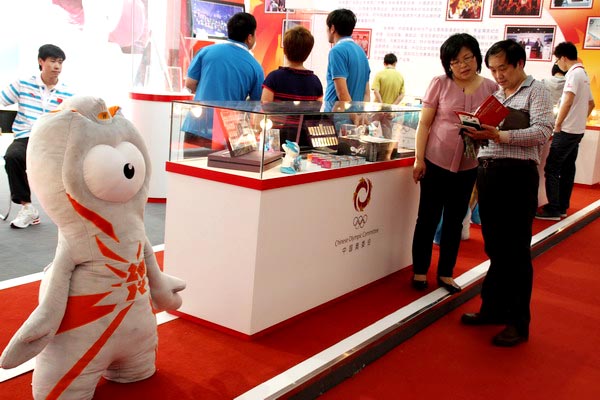65% of London Games products made in China
Updated: 2012-08-01 16:41
(chinadaily.com.cn)
|
|||||||||||
If you are a big fan of collecting Olympic products, now give some credit to "made-in-China"
Chen Jiemin, chairman of Dongguan Zhanhong Weaving String Co Ltd, watched with pride on TV the tens of thousands of London Olympics athletes and workers wearing lanyards made by his company.
Zhanhong Weaving, one of the many licensed Chinese manufacturers for the current Olympics, has shipped 700,000 lanyards to London. "Small and peripheral as it seems, even a single lanyard can represent the global image of 'made in China', so its quality is the first thing I care about," Chen said.
About 65 percent of the London Olympic Games' licensed products, including badges, key chains, and official mascots Wenlock and Mandeville, come from the world's second-largest economy, according to Xinhua.net.
|
 London Games' licensed products draw visitors at the 30th China Sports Show in Beijing, May 18, 2012. [Photo/Asianewsphoto] |
China is the first country to get permission to sell licensed Olympic products outside the host nation, which is unprecedented in the history of the Games. Collectors keen for Olympic products are able to get them at relatively fair prices, no higher than in London, in more than 3,000 Olympic franchise stores in China, according to a report on Beijing Television.
Xinhua News Agency reported on July 21 citing Ministry of Commerce researcher Mei Xinyu that "made in China" represents an increasing advantage in terms of price competition, which in turn can help to maintain a stable foreign-trade environment.
Relying on its huge domestic market, China has the advantage of a stable macroeconomic environment and market initiative in the global economy, Xinhua quoted Mei in the report.
"'Made in China' has been an indispensable part of the globalized world economy, there is no denying it," said Xiao Yaofei, deputy chief of Research Center for International Trade and Economics under Guangdong University of Foreign Studies.
"Yet our job is not done. The next step is to move up the value chain and vie for more value-added profits in the global arena."
Related Stories
Future is clear after London spectacular 2012-08-01 10:55
$42m for the Games opening ceremony 2012-07-30 11:13
Cashing in on the Olympic demand 2012-07-28 09:19
China-made fireworks light up London Olympics 2012-07-28 09:18
Chinese advertisers less interested in London Olympics 2012-07-27 15:52
Today's Top News
President Xi confident in recovery from quake
H7N9 update: 104 cases, 21 deaths
Telecom workers restore links
Coal mine blast kills 18 in Jilin
Intl scholarship puts China on the map
More bird flu patients discharged
Gold loses sheen, but still a safe bet
US 'turns blind eye to human rights'
Hot Topics
Lunar probe , China growth forecasts, Emission rules get tougher, China seen through 'colored lens', International board,
Editor's Picks

|

|

|

|

|

|





